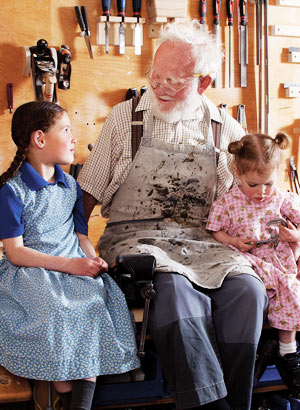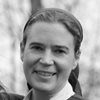Subtotal: $
Checkout
The Plough Music Series is a regular selection of music intended to lift the heart to God. It is not a playlist of background music: each installment focuses on a single piece worth pausing to enjoy.
Heiner Köppschall worked for most of his life as a shepherd, first in northern England and Wales, and then in East Sussex, where in recent years he cared for a flock of one hundred ewes and their lambs. He could be seen daily walking through the flock, singling out particular sheep for attention, and was happy to chat with passers-by who would stop to watch the lambs or admire his impressive vegetable garden.
Heiner was also a singer. Although he had little musical training, he had an unforgettable tenor voice and loved to sing: folk songs, arias from sacred oratorios, and, most memorably, Schubert's Lieder. This gift served him well very early in life:
I was born a year before the Second World War in a town called Stettin – it’s part of Poland now where the Oder River goes into the Baltic. So I woke up to life with sirens going and rushing into shelters, bombs falling all over the place. You came out of the bunkers and literally streets and houses were flattened. So for some reason or another I lost my mum. I don’t know how, but we got separated through all this bombing business. And then I landed on the street and slept in a different house every night. I sang and people let me in.

After about two years on the street he was taken to an orphanage.
And these orphanages, I wouldn’t recommend them to anyone. They were like hell on earth. It had an effect on you – you didn’t trust anyone. I do remember one incident: The matron had her fiftieth birthday and this doctor asked me to sing to her. I sang Der Mond Ist Aufgegangen (“The moon has gently risen,” a beloved evening song). That’s the first time I heard a woman cry.
In 1949 Heiner was sponsored by a church and moved into a home in northern England with ten other orphans and displaced children.
The Germans were very keen to get us back. If they would have forcefully tried to do it we would have "done a bunk” – we would have disappeared. Anyway they finally came to an agreement that providing we got a training, we could stay until we were eighteen. We knew what they wanted us back for – they wanted us to go to the military. No way did we go back. We stayed in Britain.
I only got into third grade; that’s about it. I can certainly read but basically can't write. So don’t ask me to sight-read this song or that because I have absolutely no idea. Music is just one of those things that is in the blood, I think.
Then I left school. I first started milking cows. I know there was one thing I was a bit fanatic about, and that was sheep. After school I lived on a farm for six years, and for the first three years I did nothing but work, eat, and sleep. I was so depressed. It just happened that a new chap came to help on the farm, and I used to sing, you know, songs and parts of oratorios that I had learned from tapes or on the radio, and he said that I should go and try to join a choir.
The reason why I am talking about this singing business is because it has had a lot of play in my life. It already started as a tiny kid, before when I was on the streets. And somehow it led me from one thing to the other.
Heiner became acquainted with Judith, his wife of forty-seven years, when she asked him to drive her to a weekly choir practice.
If it wasn’t for Judy I know I wouldn’t be in the church. But then again, you cannot say that either, because God has got a marvelous way of getting the most obstinate of critters to follow him. I mean, let’s face it: it’s true as far as I can see it. And I know that I dug in my heels, but I also feel God had a different idea about that.

The strength of character that helped Heiner to survive his early years never left him, and he was always ready to speak his mind, but his later years were marked by joy in others and especially the children around him. He recently commented during a family meal, “I know that it won’t all be perfect until Jesus returns, but I believe that God wants his kingdom here on earth and I’m going to fight for it and not give up.”
On Sunday, August 10, Heiner and Judith were at a celebration with other members of their church. A German folksong, “Wer recht in Freuden wandern will” (Who truly wants to walk with joy), was sung, and Heiner commented that the most important verse was missing in the song book:
Da zieht die Andacht wie ein Hauch
durch alle Sinnen leise,
da pocht ans Herz die Liebe auch
in ihrer stillen Weise,
pocht und pocht, bis sich's entschliesst
und die Lippe überfliesst
von lautem, jubelndem Preise
vom Preise.
The prayer goes like a breeze
Quietly through all our senses,
And love knocks at our hearts in its quiet way.
It knocks and knocks until our hearts are unlocked
And lips overflow with the sounds of jubilant praise.
Shortly after, he excused himself from the gathering as he was not feeling well, and died minutes later. This week’s music selection is a recording made of Heiner in 2013 at the age of 75, singing what some consider Schubert’s most perfect Lied, a setting of Goethe’s Wandrers Nachtlied.
Über allen Gipfeln
Ist Ruh,
In allen Wipfeln
Spürest du
Kaum einen Hauch;
Die Vögelein schweigen im Walde.
Warte nur, balde
Ruhest du auch.
Above all summits
it is calm.
In all the tree-tops
you feel
scarcely a breath;
The birds in the forest are silent,
Only wait, soon
you too will rest.

 Heiner Köppschall (1938-2014)
Heiner Köppschall (1938-2014)
Already a subscriber? Sign in
Try 3 months of unlimited access. Start your FREE TRIAL today. Cancel anytime.







Bradley Bahler
God certainly has chosen that which is not to bring to nothing that which is. A soul and voice as singular as a falling star jetting across a midnight sky. What a privilege to hear!
Tim Johnson
Lovely tributes to a lovely man. Heiner used to spend Sundays and "family supper" with our family in England. A few years ago I stopped by Darvel with my sister Rosie. A white-bearded man stood by the fence. "It's Heiner!" said Rosie, and "Rose!" said Heiner, then "and Timmy"! In minutes, the years dropped away. Warm memories of our childhood friend remain, to soften the sadness of his passing.
Sara
What a beautifull voice this man had. I loved the song Wandrers Nachtlied, thank you. If you have more songs recorded please share them with us. Sara
Barnabas D. Johnson
Heiner's "orphan family" in England was supplemented by his special place within my family, almost as a brother. We last sang together in a field of sheep; the time before, it had been at mother's funeral. Dear friend, rest in peace!